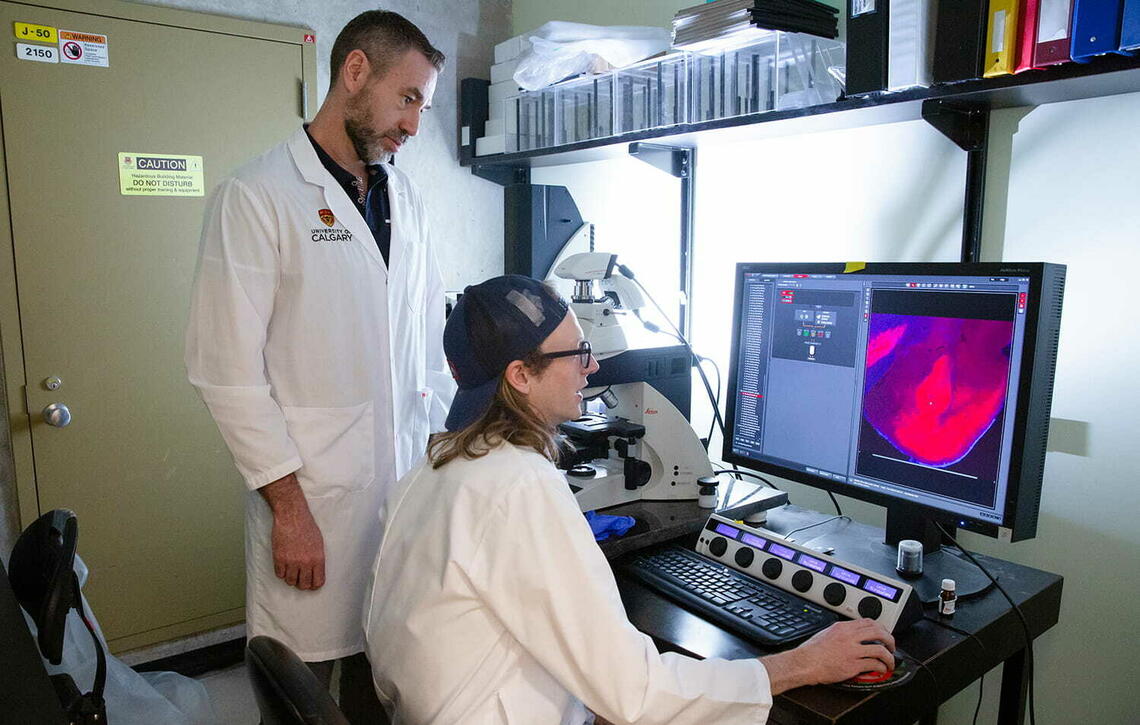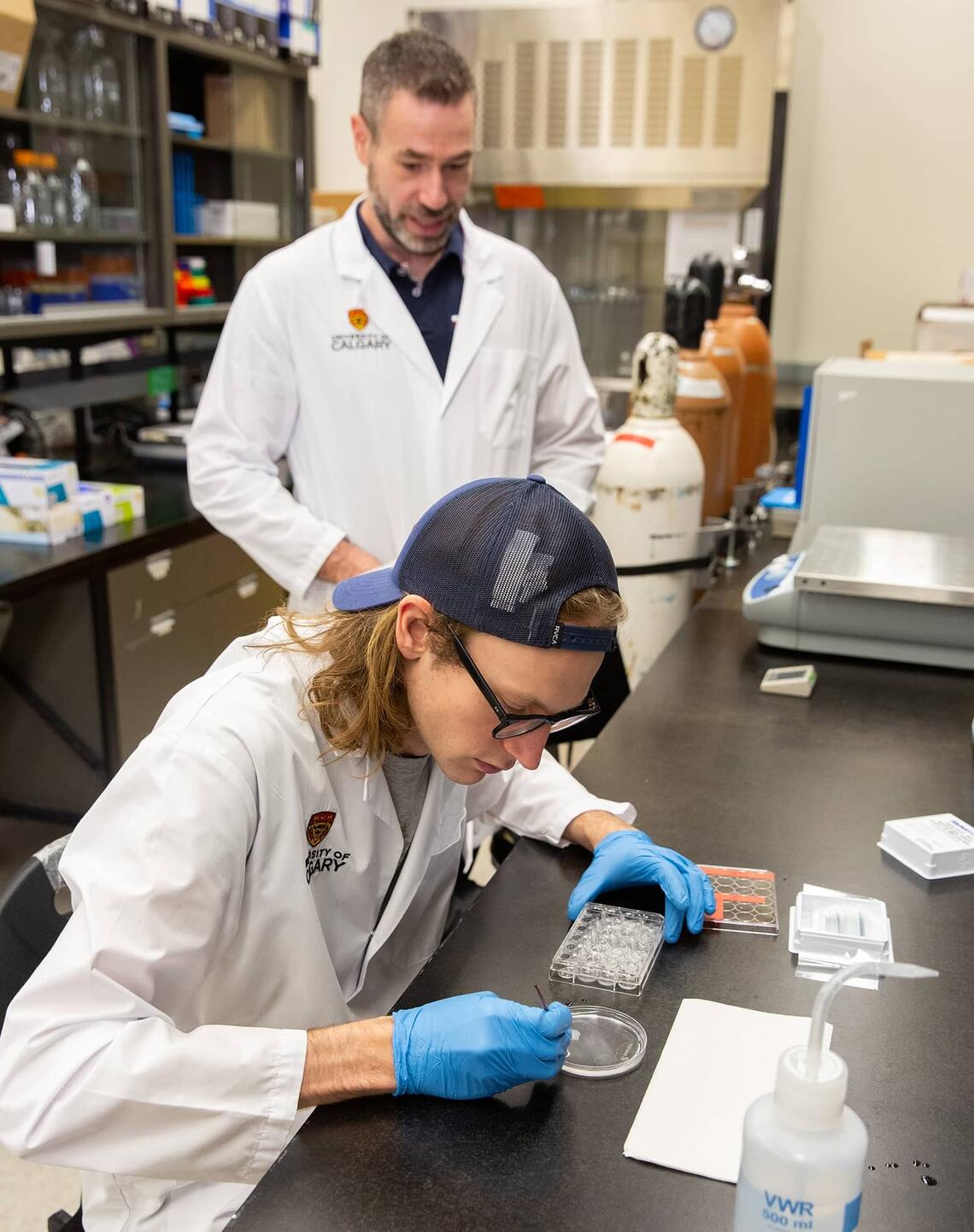This is the most exciting initiative I have ever been involved in
With MIST, we have the incredibly unique opportunity to rapidly evaluate novel therapeutic interventions for a host of mental health conditions associated with stress and trauma, that are both informed by foundational science and have the potential for accelerated conversion to patient care. I’ve been involved in this field for more than two decades, and this is the most exciting initiative I have ever been part of. It possesses the greatest likelihood that I’ve seen to have direct beneficial impact on our community.
Dr. Matthew Hill, PhD
MIST Research Chair
Inaugural Chair of MIST
The Hotchkiss Brain Institute (HBI) at the Cumming School of Medicine is pleased to announce Dr. Matthew Hill, PhD, as the first Chair of the Mental Health Initiative for Stress and Trauma (MIST). As Chair, Dr. Hill is leading MIST to explore how stress and trauma impact the brain, and what can be done to create healthier outcomes for people. An internationally recognized researcher in his field, Dr. Hill has spent more than two decades (with over 12 years leading his lab) exploring the neurobiology of stress and how it relates to the development of psychiatric illness. His work has helped us better understand how stress hormones modify the brain and our behaviour, and has shed light on how stress is the primary cause of mental health conditions like mood and anxiety disorders, as well as PTSD (post-traumatic stress disorder). Dr. Hill’s work has also been extremely influential to other researchers in the field, forging many transdisciplinary collaborations, and leading to several clinical trials for novel medications to treat anxiety and trauma-related psychiatric disorders.

Dr. Matthew Hill (left) and his graduate student Robert Aukema use immunohistochemistry, a lab technique to visualize proteins, to look at endocannabinoid receptors in the brain.
The creation of MIST, and the induction of Dr. Hill as the first MIST Chair, is a true testament to the power of community. Ignited by the suicide of beloved Calgarian, Mike McClay, community members contributed more than $1 million in philanthropic support to fuel MIST in its first year; now embarking on its third year of research and education, MIST is supported by nearly $5 million in philanthropic funds. With Dr. Hill’s experience, exceptional track record, and unparalleled strength and authenticity in connecting with individuals and community, he is also the ideal candidate to translate the research into public education and awareness. Under Dr. Hill’s leadership, MIST will inspire tremendous philanthropic support needed to drive new knowledge around mental health diagnoses and treatments.
Dr. Matthew Hill's experience
Select Appointments:
- Chair, Mental Health Initiative in Stress and Trauma— University of Calgary
- Professor in the Departments of Cell Biology and Anatomy and Psychiatry at the Hotchkiss Brain Institute at the University of Calgary
- Elected as a Member in the Royal Society of Canada College of New Scholars, Artists and Scientists
- Tier II Canada Research Chair in the Neurobiology of Stress
- Executive Director for the Canadian Consortium for the Investigation of Cannabinoids
- Former President of the International Cannabinoid Research Society
Select Media Appearances:
- New York Times, Canada’s Message to Teenagers: Marijuana Is Legal Now. Please Don’t Smoke It.
- Scientific American, Marijuana Madness: Hopped-Up Weed May Pose Risks for Users
- CBC News and Radio, Why Cannabis Shouldn't Be Considered A Gateway Drug: Calgary Professor Debunks Marijuana Myths
- Mind & Matter Podcast, Stress, PTSD & Endocannabinoid Biology
- PBS Documentary, The Cannabis Question
- CBC The Nature of Things, Science & Cannabis
Select Awards:
- 2023-ongoing
Chair, Mental Health Initiative in Stress and Trauma— University of Calgary - 2023
International Cannabinoid Research Society Mid-Career Investigator of the Year Award
Leadership and vision
Dr. Matt Hill’s appointment as MIST’s Research Chair is a natural fit, given his expertise and dedication to stress and trauma research. His groundbreaking work and innate talent for community engagement will ensure MIST’s success. With Dr. Hill’s leadership and vision, I am confident we will drive transformative advancements for research in mental health, stress and trauma, offering hope to those in need.
Dr. David Park, PhD, FRSC
Director, The Hotchkiss Brain Institute
Focus on stress recovery system
One focus of Dr. Hill’s work is the endocannabinoid system and its impact on the brain’s ability to process stress. The endocannabinoid system is what THC, the psychoactive ingredient in cannabis, interacts with to create its effects on the brain and body. Dr. Hill’s research has shown that the brain produces endocannabinoids (the brain’s own version of THC) in response to stress — and that these molecules help us cope with, and recover from, stress. His research has also discovered that chronic (ie. longterm) stress compromises how the endocannabinoid system works and, further, that some people living with stress-related psychiatric disorders have impaired endocannabinoid function. This makes the endocannabinoid system a key player in the development and, importantly, treatment of stress-related mood and anxiety disorders.
Harnessing the power of collaboration
Dr. Hill is harnessing the power of transdisciplinary collaboration by working directly with the MIST team. For example, Dr. Hill and Dr. Leah Mayo, PhD, who is the Parker Psychedelic Research Chair exploring interventions that boost endocannabinoid levels to treat post-traumatic stress disorder (PTSD), are currently involved in clinical trials to explore the effectiveness of new treatments. Dr. Hill is also increasing focus on traumatic brain injuries like concussion and how they affect our ability to process emotional stress (and that, when left unchecked, can lead to the development of psychiatric conditions). He and his team are exploring the largely misunderstood area of how pre-existing stress can influence the outcomes of concussions and, vice versa, how concussions can impact the way stress is processed.

Robert Aukema (front), a graduate student in Dr. Hill’s lab, mounts rat brain tissue slices onto a slide while Dr. Hill supervises.
Select published research
Dr. Hill has published over 120 scientific papers. Below is a selection of his published work.
Petrie, G.N., Balsevich, G., Fuzesi, T., Aukema, R.J., Driever, W.P.F., Van der Stelt, M., Bains, J.S., & Hill, M.N. (2023). Disruption of tonic endocannabinoid signaling triggers cellular, behavioural and neuroendocrine responses consistent with a stress response. British Journal of Pharmacology 180(24), 3146-3159.
View the paper
Vecchiarelli, H.A., Morena, M., Keenan, C.M., Chiang, V., Tan, K., Qiao, M., Leitl, K., Santori, A., Pittman, Q.J., Sharkey, K.A. & Hill, M.N. (2021). Comorbid anxiety-like behavior in a rat model of colitis is mediated by an upregulation of central fatty acid amide hydrolase. Neuropsychopharmacology 46(5), 992-1003.
View the paper
Mayo L.M., Asratian, A., Linde J., Holm, L., Natt, D., Augier, G., Stensson, N., Vecchiarelli, H.A., Balsevich, G., Aukema, R., Ghafouri, B., Spagnolo, P.A., Lee, F.S., Hill, M.N. & Heilig, M. (2020). Protective effects of elevated anandamide on stress and fear-related behaviors: Translational evidence from humans and mice. Molecular Psychiatry 25(5), 993-1005.
View the paper
Mayo, L.M., Asratian, A., Linde, J., Morena, M., Haataja, R., Hammer, V., Augier, G., Hill, M.N. & Heilig, M. (2020). Elevated anandamide, enhanced recall of fear extinction and attenuated stress responses following inhibition of fatty acid amide hydrolase: A randomized, controlled experimental medicine trial. Biological Psychiatry 87(6), 538-547.
View the paper
Hill, M.N., Campolongo, P., Yehuda, R. & Patel, S. (2018). Integrating endocannabinoid signaling and cannabinoids into the biology and treatment of post-traumatic stress disorder. Neuropsychopharmacology 43(1), 80-102.
View the paper
Qin, Z., Zhou, X., Pandey, N.R., Vecchiarelli, H.A., Stewart, C.A., Zhang, X., Lagace, D., Brunel, J., Beique, J.-C., Stewart, A.F., Hill, M.N. & Chen, H.H. (2015). Chronic stress induces anxiety via an amygdalar intracellular cascade that impairs endocannabinoid signaling. Neuron 85(6), 1319-1331
View the paper (pdf)
Dincheva, I., Drysdale, A.T., Hartley, C.A., Johnson, D.C., Jing, D.Q., King, E.C., Ra, S., Gray, J.M., Yang, R.R., DeGruccio, A.M., Huang, C., Cravatt, B.F., Glatt, C.E., Hill, M.N., Casey, B.J. & Lee, F.S. (2015). FAAH genetic variation enhances frontoamygdala function in mouse and human. Nature Communications 6, 6395.
View the paper
Hill, M.N., Bierer, L.M., Makotkine, I., Golier, J.A., Galea, S., McEwen, B.S., Hillard, C.J. & Yehuda, R. (2013). Reductions in circulating endocannabinoid levels in individuals with post-traumatic stress disorder following exposure to the world trade center attacks. Psychoneuroendocrinology 38(12), 2952-2961.
View the paper


